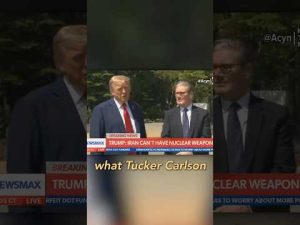In a world where chaos seems the norm, tensions are once again unfolding in the Middle East, with Israel and Iran locking horns in a risky standoff. The drama has escalated to a point where Iran is reportedly seeking ways to backtrack and, humor of all horrors, return to the negotiating table, given everything doesn’t completely unravel first. As in any geopolitical screenplay worth its salt, the U.S., currently led by President Trump, finds itself with a front-row seat—whether they want it or not—and the USS Nimitz is sailing into the region just to make sure everyone knows they’re watching.
Israel, not one to mince words or actions, decisively struck the Iranian State TV building in Tehran. And they didn’t do it on a whim—they issued a warning prior, underscoring that they mean business. The Israeli Prime Minister seems quite confident. He claims the skies over Tehran are now Israeli territory, and he’s making bold pronouncements about eliminating both nuclear and missile threats. It’s like watching the opening moves of a chess game, except there’s very little check and a lot more mate on the table.
Amidst this tumult, Iran seems to be rethinking its bravado. Despite rumblings of retaliatory strikes, nothing serious has materialized. It’s almost like someone’s been bluffing in a high-stakes poker game and realized they are running out of chips. Iran is perhaps finally noticing the writing on the wall, realizing that when it comes down to it, they aren’t exactly winning the war, and their threats haven’t been as credible as they’d hoped.
From the perspective of President Trump, this development is hardly surprising. He’s been sounding the clarion call that Iran shouldn’t possess nuclear weapons, a consistent message throughout his presidency. Even during the G7 meetings in Canada, the matter hasn’t been left off the agenda. Trump urges a deal before it’s too late for Iran, and with Israel unrelenting in its airstrikes, there’s some heavy pressure for Iran to make a move, and quick. If they were banking on American apathy, they might want to recall Uncle Sam’s penchant for not sitting things out when allies are in play.
Meanwhile, the debates rage on among America’s policymakers—should they further aid Israel with resources to strengthen their hand against a nuclear Iran? Are experiences from past military interventions informing today’s strategies, or is America poised to repeat a similar cycle somewhere down the line? President Trump seems to carry the weight of ensuring Iran’s nuclear adventure ends without a U.S.-led regime change—a climax with unpredictable and risky aftershocks. As we sit on the edge, a resolution feels imperative, not just for regional stability, but for the future direction of U.S. engagement in such high-stakes international disputes. And there it seems, trusting Trump over Iran becomes somewhat the inevitable choice, unless sanity somehow loses its significance.







